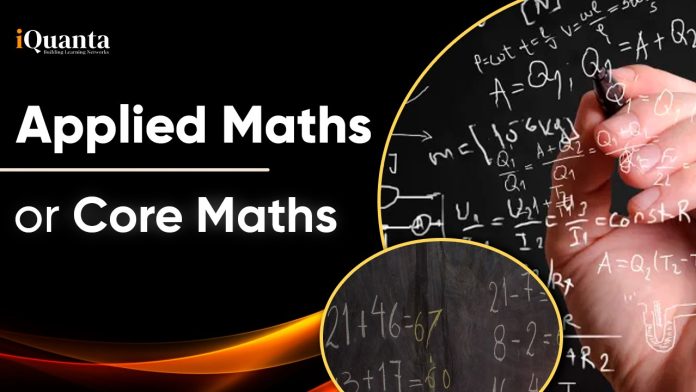Choosing the right mathematics stream for IPMAT preparation is a key decision that impacts both your exam performance and your future academic path. Since the Quantitative Aptitude section requires a solid grasp of mathematical concepts, laying the right foundation early is essential. Many aspirants struggle to decide between Core Mathematics and Applied Mathematics, as both have distinct approaches and implications.

Core Mathematics is more theoretical, covering advanced topics like calculus and algebra. It sharpens analytical thinking and problem-solving skills, making it useful for competitive exams. Applied Mathematics, on the other hand, emphasizes real-world applications, making concepts more relatable but with less focus on abstract problem-solving. This choice also extends beyond IPMAT—some colleges prefer Core Mathematics for management and finance programs, which could influence future academic and career opportunities.
Ultimately, your decision should align with your strengths, learning style, and long-term goals. Understanding the differences and their impact can help you pick the stream that best supports both your exam preparation and future aspirations.
Understanding the Difference
Mathematics is a crucial component of the IPMAT exam, and selecting the right stream can significantly impact your preparation and performance. Let’s understand the fundamental differences:
- Applied Maths: Focuses on real-world applications and practical problem-solving techniques. Topics such as statistics, financial mathematics, and data handling make it a more business-oriented subject
- Core Maths: Emphasizes theoretical and abstract concepts, including calculus, algebra, trigonometry, and vector geometry. It is more rigorous and suited for students aiming for technical or analytical careers
Why is Maths Important for IPMAT?
IPMAT (Integrated Program in Management Aptitude Test) is an entrance exam for students aspiring to join the five-year Integrated Program in Management at prestigious institutes like IIM Indore and IIM Rohtak. The exam includes sections on Quantitative Aptitude, which requires a strong foundation in mathematics.
Aspirants often wonder which mathematics stream is best suited for IPMAT. While both Applied Maths and Core Maths cover essential topics, their relevance to the exam varies.
Topics Covered in Applied and Core Maths for IPMAT
To help you decide, here’s a breakdown of key topics covered in both streams and their importance for IPMAT.
Applied Maths (Class 11)
| Topic | Importance for IPMAT |
| Numbers, Quantification, and Numerical Applications | Important |
| Algebra | Important |
| Mathematical Reasoning | Not Important |
| Calculus | Not Important |
| Probability | Important |
| Descriptive Statistics | Not Important |
| Basics of Financial Mathematics | Not Important |
| Coordinate Geometry | Important |
Applied Maths (Class 12)
| Topic | Importance for IPMAT |
| Numbers, Quantification, and Numerical Applications | Important |
| Algebra | Important |
| Calculus | Not Important |
| Probability Distributions | Not Important |
| Inferential Statistics | Not Important |
| Index Numbers and Time-based Data | Not Important |
| Financial Mathematics | Not Important |
| Linear Programming | Not Important |
Core Maths (Class 11)
| Topic | Importance |
| Sets | Important |
| Relations and Functions | Important |
| Trigonometric Functions | Important |
| Principle of Mathematical Induction | Not Important |
| Quadratic Equations | Important |
| Linear Inequalities | Important |
| Permutations and Combinations | Important |
| Binomial Theorem | Important |
| Sequences and Series | Important |
| Straight Lines | Important |
| Conic Sections | Important |
| Introduction to Three Dimensional Geometry | Not Important |
| Limits and Derivatives | Not Important |
| Mathematical Reasoning | Not Important |
| Statistics | Not Important |
| Probability | Important |
Core Maths (Class 12)
| Topic | Importance for IPMAT |
| Relations and Functions | Important |
| Inverse Trigonometric Functions | Not Important |
| Matrices | Important |
| Determinants | Important |
| Continuity and Differentiability | Not Important |
| Application of Derivatives | Not Important |
| Integrals | Not Important |
| Application of Integrals | Not Important |
| Differential Equations | Not Important |
| Vector Algebra | Not Important |
| Three Dimensional Geometry | Not Important |
| Linear Programming | Not Important |
| Probability | Important |
Applied Maths vs. Core Maths: Pros and Cons
Both streams have their advantages and drawbacks when it comes to IPMAT preparation. Here’s a quick comparison:
Applied Maths:
Pros:
- Covers more practical and logical reasoning concepts
- Aligns well with management studies and business-related careers
- Easier for students who prefer numbers and data interpretation over complex theoretical concepts
Cons:
- Lacks higher-level calculus and algebra, which might be needed for other competitive exams
Core Maths:
Pros:
- Provides a deeper understanding of fundamental mathematical concepts
- Suitable for students considering careers in analytics, engineering, or finance
- Covers important topics like matrices and probability, which are tested in IPMAT
Cons:
- More complex and rigorous, which might make preparation more challenging
Which One Should You Choose for IPMAT?
Your choice should depend on your career aspirations and your comfort level with mathematical concepts. If your goal is to maximize IPMAT preparation, Applied Maths might be a better choice since it aligns more with logical and numerical reasoning, which are crucial for management exams. However, if you plan to keep engineering or mathematics-intensive fields as an option, Core Maths might be more beneficial.
For most IPMAT aspirants, Applied Maths is a strategic choice as it covers essential quantitative concepts needed for the exam without the complexity of advanced calculus and algebra found in Core Maths.
However, if you are aiming for a broader range of competitive exams or want to keep options open for careers in finance, data analytics, or engineering, Core Maths may still be worth considering. Choosing the right stream can enhance your preparation and give you an edge in the IPMAT exam. Analyze your strengths and career goals before making a decision!


